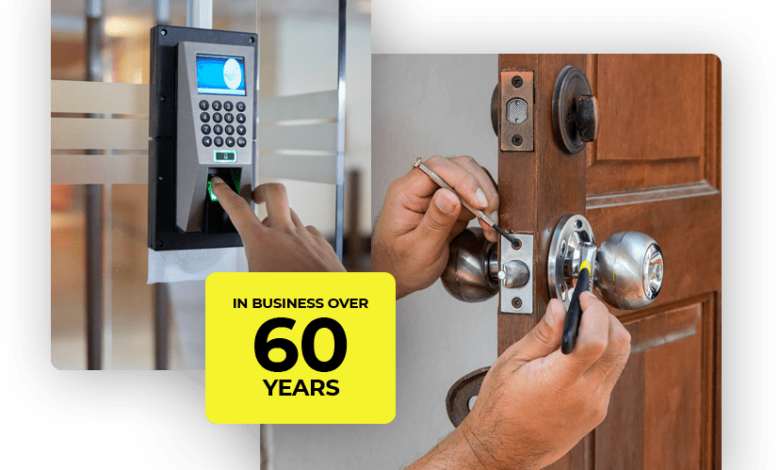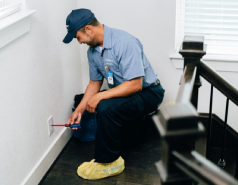Preventative Maintenance Tips from Commercial Door Locksmiths

Commercial door locks play a vital role in protecting your business, employees, and assets. Over time, regular use, environmental factors, and wear and tear can compromise the integrity of your locks. Proactively maintaining your commercial door locks not only extends their lifespan but also ensures smooth functionality and enhanced security. Here are some expert tips from commercial locksmiths to help you keep your locks in peak condition and avoid costly repairs. Commercial Door Locksmiths.
1. Regularly Clean Your Locks
Dirt, grime, and debris can accumulate inside locks over time, leading to jamming or reduced functionality. Regular cleaning helps prevent these issues and keeps your locks operating smoothly.
- How to Clean: Use a dry cloth to wipe down the exterior of the lock. For internal mechanisms, use a lock-specific cleaner or compressed air to remove debris.
- Avoid Harsh Chemicals: Do not use abrasive cleaners that may damage the lock’s finish or internal components.
Pro Tip: Schedule a meeting with a commercial door locksmith for lock checks every few months for locks in high-traffic areas.
2. Lubricate Moving Parts
Locks have multiple moving parts that can wear down without proper lubrication. Applying the right lubricant ensures smoother operation and reduces stress on the mechanism.
- What to Use: Choose a graphite or silicone-based lubricant, as these are specifically designed for locks and won’t attract dirt.
- How to Apply: Insert the lubricant into the keyhole and turn the key a few times to distribute it evenly.
- What to Check: Look for signs of wear, such as loose screws, misaligned components, or rust. Test the lock to ensure it turns smoothly and the latch engages properly.
- Address Issues Early: Tighten screws, realign hardware, or replace worn parts as needed to prevent further damage.
Pro Tip: Schedule quarterly inspections for high-use locks to catch issues early.
4. Replace Worn or Damaged Keys
Using worn or damaged keys can put stress on your locks, leading to faster wear or even breakage.
- When to Replace Keys: If you notice bending, cracks, or excessive wear, replace the key immediately.
- Consider Duplicate Keys: Keep spare keys available to avoid overusing one set.
Pro Tip: Use high-quality key blanks for replacements to ensure longevity and proper fit.
5. Protect Locks from Weather and Environmental Factors
Exposure to weather can cause locks to rust or freeze, especially in outdoor commercial settings.
- Use Protective Covers: Install weather-resistant covers over outdoor locks to shield them from rain, snow, and extreme temperatures.
- Prevent Freezing: In cold climates, use lock de-icers or a silicone lubricant to keep locks from freezing during winter months.
Pro Tip: Consider weatherproof locks for exterior doors to enhance durability.
6. Upgrade to High-Quality Locks
Not all locks are created equal, and commercial doors often require robust, heavy-duty locks to withstand frequent use.
- Choose Durable Materials: Invest in locks made of steel or brass for enhanced durability.
- Consider Smart Locks: Upgrading to electronic or smart locks can reduce wear on mechanical components and offer added security features like keyless entry.
Pro Tip: Consult with a commercial locksmith to select locks that suit your business’s specific needs.
7. Train Employees on Proper Lock Usage
Improper lock usage can lead to unnecessary wear or even damage. Educating employees on correct practices can go a long way in maintaining your locks.
- Best Practices: Ensure employees use the correct key for each lock and avoid forcing locks if they jam.
- Access Control: Limit the number of people with access to keys to reduce misuse.
Pro Tip: Create a clear lock usage policy and provide training during onboarding.
8. Schedule Professional Maintenance
Even with regular upkeep, professional maintenance is essential for ensuring long-term lock performance.
- What Locksmiths Do: Professionals can clean, lubricate, and inspect locks more thoroughly. They can also recalibrate smart locks or fix advanced locking systems.
- Frequency: Schedule annual or semi-annual checkups, depending on the volume of use and lock type.
Pro Tip: Build a relationship with a trusted commercial locksmith for routine maintenance and quick service when needed.
Conclusion
Preventative maintenance is the key to extending the lifespan of your commercial door locks and avoiding costly repairs or replacements. By incorporating these tips into your routine, you can ensure that your locks remain reliable, secure, and efficient. Regular care, combined with professional locksmith services, provides the peace of mind that your business’s security is in good hands.
If you’re unsure about the condition of your locks or need professional assistance, reach out to a reputable commercial locksmith to keep your doors—and your business—secure. Commercial Door Locksmiths.
See Also: Editor Benjamin Tech Guru Keezy.co.
FAQs
1. How often should I lubricate my commercial locks?
Lubricate locks every 3–6 months, or more frequently for high-traffic doors.
2. Can I clean and maintain locks myself, or should I call a professional?
Basic cleaning and lubrication can be done yourself, but schedule professional maintenance annually for a thorough inspection.
3. How do I know if my lock needs replacing?
Signs include difficulty turning the key, visible rust or wear, and repeated malfunctions despite maintenance.
4. Are smart locks easier to maintain than traditional locks?
Yes, smart locks typically require less mechanical maintenance but may need occasional software updates or recalibration.
5. What should I do if my lock freezes in cold weather?
Use a lock de-icer or apply a silicone-based lubricant to thaw and prevent freezing.




